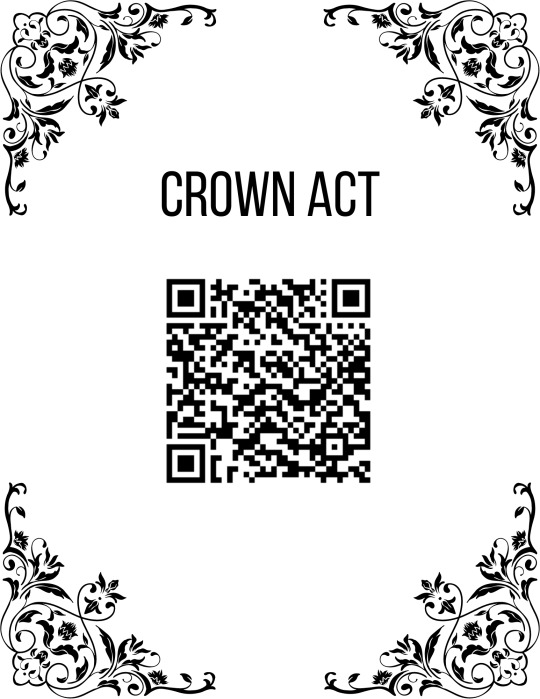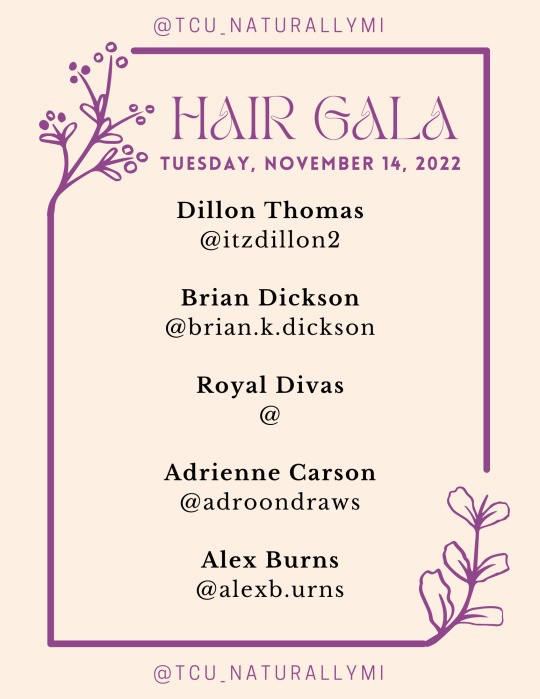A special interest organization designed to act as a connector for the natural hair community on campus and any and all individuals interested in it. It is designed to motivate and inform people about the beauty of different natural hair types and open discussion about related topics. The organization is open to individuals of any hair type, race, ethnicity, gender, sexual orientation, or religious affiliations.
Don't wanna be here? Send us removal request.
Text
Visual art pieces by TCU students on display at the NaturallyMi Hair Gala. The pieces match gala initiatives, highlighting black beauty through the embrace of natural hair styles. For more art by those contributing to the exhibit, look to @adroondraws, @alexb.urns, and @brian.k.dickson on Instagram.
0 notes
Text
TCU’s very first majorette team, The Royal Divas, take the stage and deliver a fantastic performance at the Hair Gala.
The history of majorette dancing dates back to 1968, with the first official team called “The Golden Girls” at Alcorn State University. Since then, this style of beautiful, engaging, jazz and hip hop infused dancing has swept HBCUs across the country. Fast forward to 2022, founder Sherlee Pollock goes against all odds, makes history, and breaks down barriers by bringing together a diverse group of women of color and forming The Royal Divas at a predominantly white institution.
instagram
0 notes
Text
Singer and artist Brian Dickson Jr. performs “Brown Skin” by India Arie. This song highlights the ethereal beauty and magic found within the uniqueness of Black people, like the Hair Gala showcases as well.
0 notes
Text




NaturallyMi Hair Gala 2022
"NaturallyMi’s Hair Gala is an annual event that aims to celebrate the artistic nature of black hair traditions across the diaspora throughout time through creative avenues of expression, including, but not limited to, the visual and performing arts. With this being said, the Hair Gala is in celebration of the triumph of our ancestors through hardships and the celebration of the beauty we found in spite of such hardships.
The art we explore traverses through our early history on the African continent, where colonialism had not yet attempted to control the innovation and familial pride atop our heads, to the early colonial, modern period, in which the Tignon Laws mandated our hair be masked away from the Earth. In spite of this, our headscarves became known as a mark of distinction and were widely imitated, marking our innovation even within those confined spaces.
Even in these years, cornrows served as one of many ways we found our voice in the midst of being silenced, maps crafted by skilled braiders serving as messages by which we would find our way to freedom.
As soon as our ancestors were loosed upon the world, hair became a vessel by which we found a place of comfort, within the barbershops and salons, bringing back a sense of community so many had tried to break apart. Businesses grew from our ties to hair, and from this, small seeds of wealth and creation were sown to give new generations hope in a world that tried to cast them aside.
These seeds grew into the creativity, pride, and innovation of black hair many of us grew up admiring. Natural ‘fros burst free from caps and scarves, and braids, bantu knots, finger waves, twists, locs, fades, waves, 27-pieces and weaves, and all the things of beauty I see within you all and me.
It’s important that we acknowledge we are not free from discrimination, the skeptics, and the oppression against our hair. In fact, it is more important than ever that we do not forget at the Hair Gala. Many of us have our own harrowing stories, and at the Hair Gala, we must lift those stories up as rightful causation to the positive effects that the CROWN Acts across the nation intend to bring. Standing for Creating a Respectful and Open World for Natural Hair, the CROWN Act was drafted and sponsored by California State Senator Holly Mitchell to ensure protection against discrimination based on race-based hairstyles by extending statutory protection to hair texture, and protective styles such as braids, locs, twists, and knots in the workplace and public schools.
We celebrate the states and cities across the United States that have taken initiative to protect people like you and me from hair discrimination. For those who have not, we must use our power as people to do what we can, whether that be voting, emailing senators, or signing petitions.
These are not simply hairstyles for us. They are our history, our present, and our future. They are who we are, and for this, at the Hair Gala, we take a look into how we must celebrate and lift our crowns up." - Breann Borlay, NaturallyMi President, 2022-23
1 note
·
View note